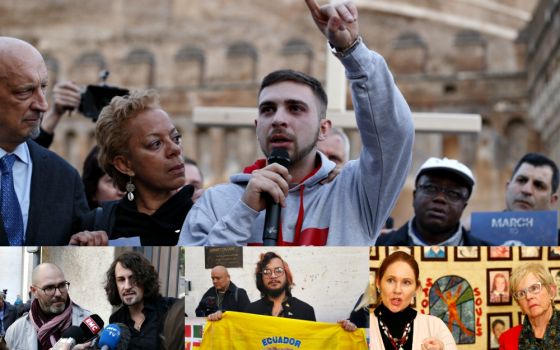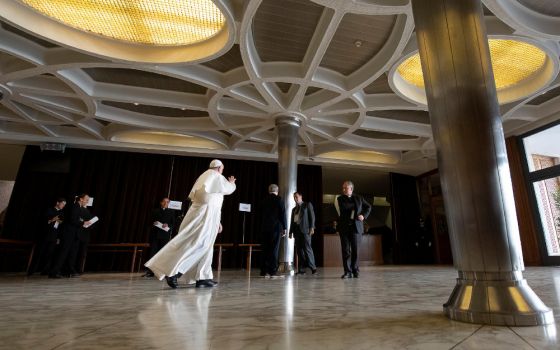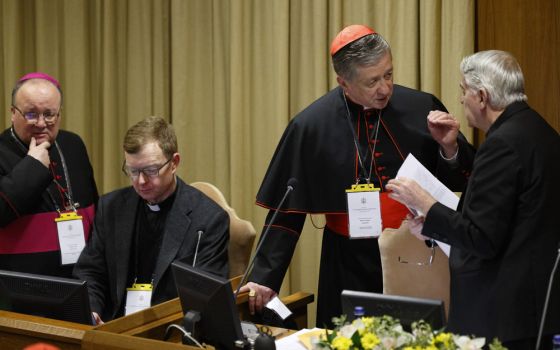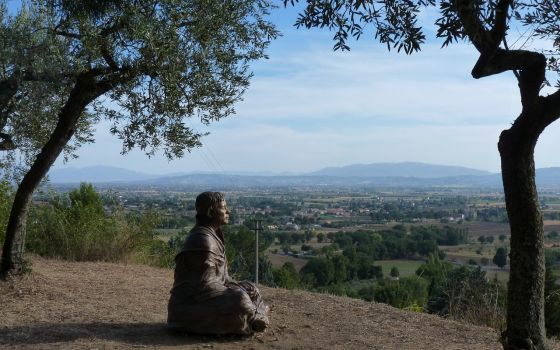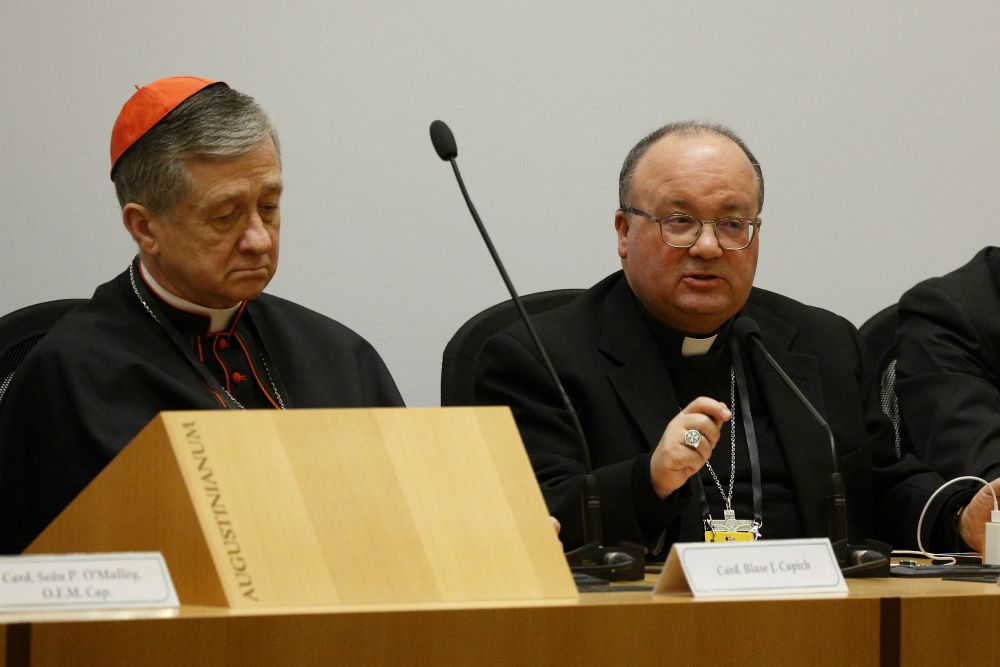
Cardinal Blase Cupich of Chicago, left, and Archbishop Charles Scicluna of Malta attend a media briefing Feb. 22, the second day of the Vatican meeting on the protection of minors in the church. Following the meeting's close, Cupich spoke to NCR in an interview Feb. 25 at the Pontifical North American College, and Scicluna spoke to NCR in an interview Feb. 26 at the Vatican's Congregation for the Doctrine of the Faith. (CNS/Paul Haring)
Two of the bishops who organized Pope Francis' recent summit on clergy sexual abuse say the Vatican should begin disclosing the reasons for a Catholic prelate's removal from office, signaling a potentially significant policy change for the global church.
In separate exclusive half-hour interviews with NCR, Chicago Cardinal Blase Cupich and Maltese Archbishop Charles Scicluna also both indicated that procedures the pope developed in 2016 to initiate the removal of bishops found negligent in clergy abuse cases may be updated to make them more transparent.
The prelates likewise shared hopes that the involvement of 12 women during the Feb. 21-24 meeting on child protection would set a standard for the growing participation of women at future Vatican meetings, including synods of bishops.
On the issue of telling the public why a bishop is being removed from office, Cupich and Scicluna were each quite blunt.
"I think if a person is removed from office the reason should be given why," said Cupich, speaking in a Feb. 25 interview at the Pontifical North American College. "There is no reason that should not be the case."
Scicluna, speaking in a Feb. 26 interview at the Vatican's Congregation for the Doctrine of the Faith, said that in the past "there was a resistance to giving the real reason or the reasons."
"That needs to change," said the archbishop, who leads the archdiocese of Malta and is an adjunct secretary at the doctrinal congregation.
Scicluna noted that a bishop's removal might be due to reports sent to Rome from the prelate's diocese or his national conference. People, he said, "have a right to know the outcome of their report."
Cupich and Scicluna organized the clergy abuse summit alongside Indian Cardinal Oswald Gracias, Jesuit Fr. Hans Zollner and two undersecretaries for the Vatican's Dicastery for Laity, Family and Life: Linda Ghisoni and Gabriella Gambino.
The Vatican does not presently give any reason when a bishop is removed from office. The announcement is made in its daily bulletin that the prelate has "renounced pastoral governance" of his diocese.
Although the Vatican would formerly identify the church canon under which a bishop had resigned, allowing observers to make an educated guess for the reasons behind the resignation, that practice ended in September 2016.
Advertisement
Abuse survivors and advocates have long argued that naming the reasons for bishops' resignations would act as an incentive for prelates to handle abuse cases according to procedure.
In his interview, Cupich noted that the Vatican has said in the past when a bishop is being removed for some sort of issue regarding his adherence to church doctrine.
"I believe that if a bishop has been removed for incompetence — financial, his administration, or whatever — those things should be said," he said.
Survivors 'made the meeting'
Cupich and Scicluna spoke in interviews focused on reviewing the events of the summit, which was the first of its kind and involved Francis, the heads of the world's bishops' conferences, superiors general of religious orders and leaders of Vatican offices.
Over four days, the 190 prelates taking part discussed three main themes related to the abuse scandals: responsibility, accountability and transparency. They also heard testimonies from abuse survivors and even experienced one survivor play the violin at an evening penitential liturgy.
Both of the bishops particularly praised the talks given at the summit by Ghisoni, Nigerian Holy Child Jesus Sr. Veronica Openibo and Mexican journalist Valentina Alazraki, who has covered the Vatican for some 40 years.
Openibo, the head of her order and a member of the executive board of the Rome-based umbrella group International Union of Superiors General, was one of 10 sisters invited to take part in the summit.
In her talk, she eloquently blasted what she called a culture of "mediocrity, hypocrisy and complacency" that she said had brought the church to a "disgraceful and scandalous place."
Cupich called Openibo "transparent and honest." Scicluna said he was "struck by the fact of her intelligence, but also her emotional intelligence."
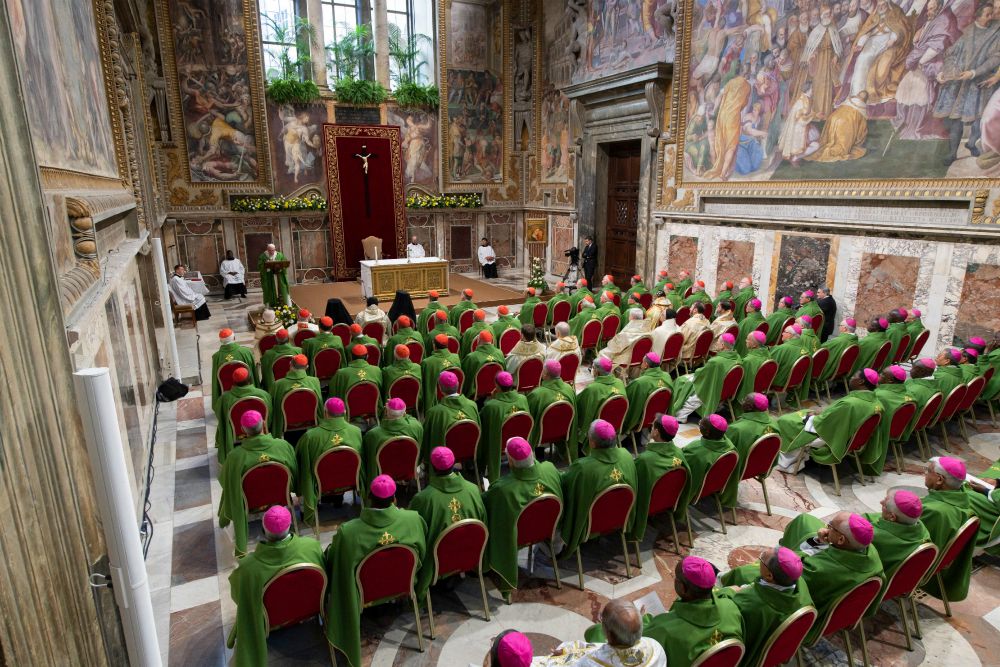
Pope Francis speaks at the conclusion of a Mass on the final day of a meeting on the protection of minors in the church at the Vatican Feb. 24. (CNS/Vatican Media)
"At the end of the day, what I take with me from Sister Veronica is her courage and her decision to talk truth to power," Scicluna said. "I think that's what she managed to do."
At a Feb. 25 briefing, six of the sisters who took part in the summit said they hoped their presence at the event sets a standard for a growing presence of women at Vatican meetings. They also expressed a desire to be appointed as full members of future synods of bishops, meaning they would be allowed to vote on synod documents.
Asked about that possibility, Cupich responded: "I think that there's no reason why we shouldn't do that. I'd be all for that."
"They added a tremendous amount to the meeting," he added.
In terms of making women's presence at Vatican meetings the norm, Scicluna responded: "I think there's a future for that."
He noted that three of the nine talks given at the abuse summit were by women. He said that "helped leadership realize the extraordinary wisdom and richness that women bring to discernment."
"You could see it happen," said Scicluna. "And you could see the pope, with his reaction and his words of appreciation, realizing that."
"I think that has to be an experience that we need to repeat," he said. "Because it was very positive and very enlightening as well."
Cupich and Scicluna likewise agreed on the impact that the survivors' testimonies had on the bishops attending the summit.
Cupich called the survivor playing violin in the apostolic palace's Sala Regia for the penitential liturgy "one of the most powerful things I've ever seen."
"I don't think there was anybody in that Sala Regia who was not deeply impacted to the heart," he said. "I saw the conversion take place in the bishops in this moment."
"It was the victims who made this meeting," he said. "That's what was key about this whole thing. We're not going to get any progress here unless we listen to the victims."
Scicluna said that meeting survivors "cannot leave you indifferent, because it is a very difficult experience."
"I keep saying, and I am convinced of this, if people really want to know what sex abuse is all about, they need to meet the victims, and listen to them," he said.
"There is no other way," said Scicluna. "It's a painful way, but there is no other way to come to terms with what we're dealing with."
Clarification on accountability process
Cupich and Scicluna spoke about disclosing the reasons for bishops' resignations in response to questions about a law Francis signed in 2016 that specifies that a bishop's negligence in abuse cases can lead to his removal from office.
The law, issued motu proprio and titled "Like a Loving Mother," empowered four Vatican offices to investigate such bishops and initiate processes of removal. But it has been unclear how each of the offices is pursuing such cases.
Cupich said that the four offices involved — the Congregations for Bishops, for the Oriental Churches, for the Evangelization of Peoples, and for Institutes of Consecrated Life and Societies of Apostolic Life — are "cooperating together" on some sort of clarification about how bishops are being held accountable.
"They can't each provide this," said the cardinal. "They have to standardize it. They have to have a common way of doing it. So they're working together right now, I understand, on making that happen."
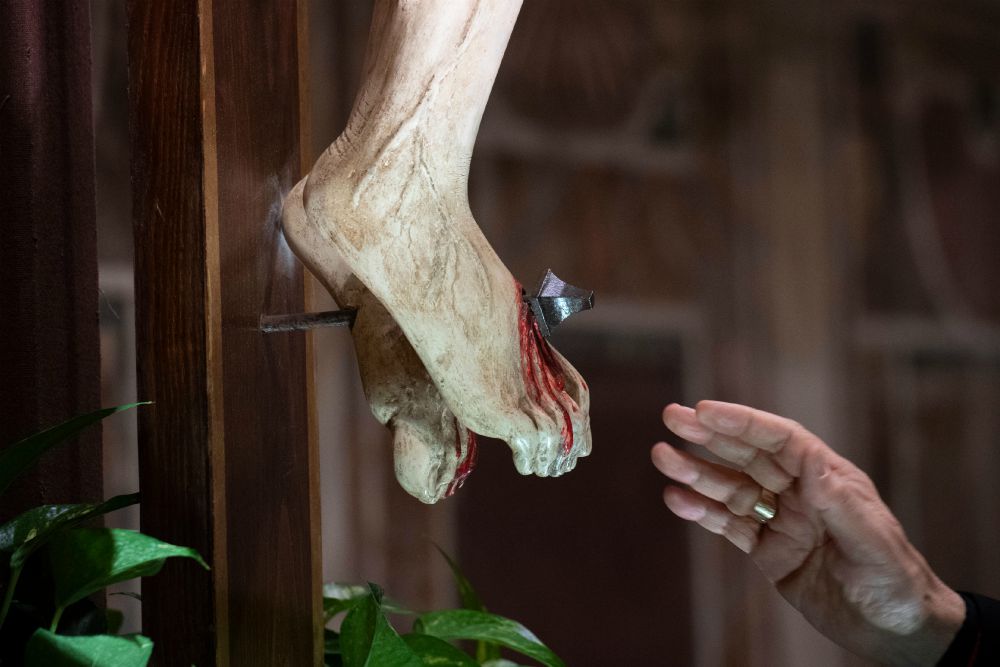
A prelate reverences the crucifix during a penitential liturgy held as part of the meeting on the protection of minors in the church at the Vatican Feb. 23. (CNS/Vatican Media)
Cupich also revealed that the law "has already been applied by the Congregation for Bishops in cases," but did not name the cases.
Scicluna said that the issue of transparency in how the law is being applied has been "on the agenda" for follow-up meetings after the end of the recent summit.
"I think that an ideal outcome would be to have clear guidelines for how bishop accountability, for personal misconduct and for questions of stewardship, are dealt with on the local level and then on the level of the Holy See," he said.
Scicluna suggested that there could be "a revised version" or a "new bylaw" to "Like a Loving Mother" that "gives a blueprint that is followed by every congregation."
Cupich and Scicluna also responded to criticism that the 2016 law watered down Francis' original decision, made at the suggestion of the Pontifical Commission for the Protection of Minors, to create a new tribunal at the Vatican to judge bishops who respond inappropriately to sexual abuse claims.
"The motu proprio … makes it clear that a bishop can be removed not because he intentionally did something wrong, that it was his fault, but incompetence," said Cupich.
"That's a much lower bar than proving fault or guilt," he said. "When people say they want a tribunal, that only complicates it."
Scicluna said that the 2016 law "does not require malice in stewardship, but the objective incapacity or inability to do the right thing."
"That makes life less difficult for people denouncing, because they don't need to prove the malice of a leader, a bishop or superior general, who is not doing his job," he said. "And removal can be not as a penalty but because that is what the good of the church and the faith community requires."
Cupich also spoke about his own talk at the summit, in which he brought forward aspects of a proposal he has previously made for the Vatican to empower metropolitan archbishops to examine accusations made against bishops in their regions.
He stressed the ecclesiological roots of the proposal, which some theologians say corresponds with powers metropolitans exercised in earlier centuries. He also said that unlike other possible plans for how to investigate bishops, the proposal would not depend on individual bishops choosing to opt in to the system.
"It cannot be opt in," said Cupich. "It has to be structured in our ecclesiological, traditional understanding of holding people accountable and that has been done in the past by the metropolitan."
"I don't think it's a safe thing to make it optional," he added. "That's not the way we should do it."
Cupich said that his proposal would see involvement of laypeople "from beginning to end," as allegations would be reported not only to the metropolitan, but also his review board and his lay advisory board.
Asked about the metropolitan proposal, Scicluna said that he thought a revision of Francis' 2016 law could "see indications on the lines of what Cardinal Cupich was proposing."
"Adopting procedure, not only for the United States but worldwide, that would deal with questions of misconduct by bishops and accountability for their stewardship, on the local level," he specified. "And then the next stage would be on the level of the Holy See."
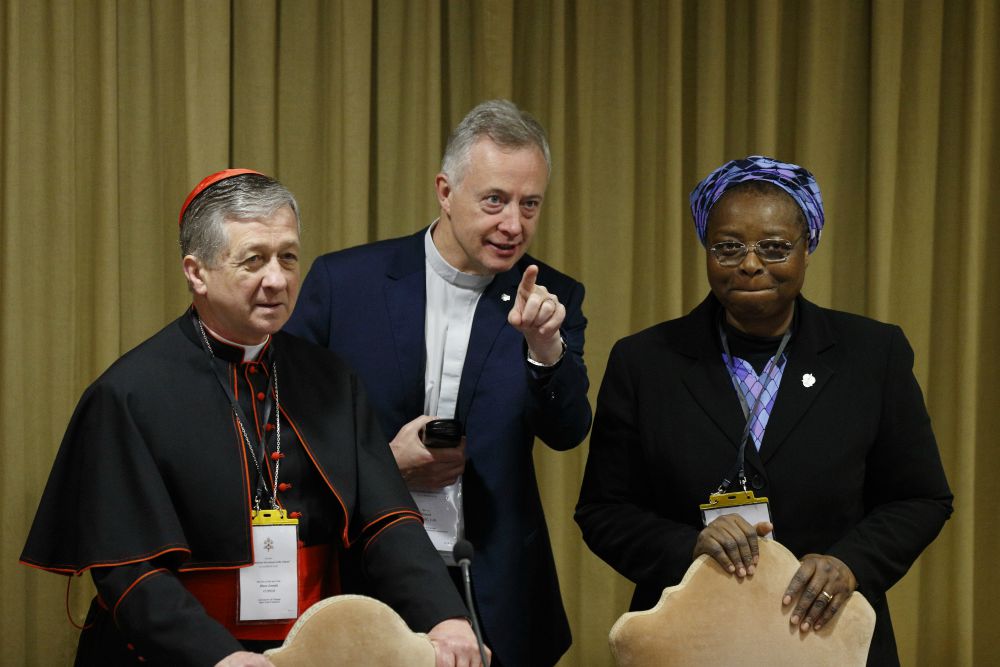
Cardinal Blase Cupich of Chicago, Fr. Tomas Mavric, superior general of the Vincentian order, and Sr. Veronica Openibo, congregational leader of the Society of the Holy Child Jesus, attend the third day of the meeting on the protection of minors in the church at the Vatican Feb. 23. (CNS/Paul Haring)
'A new trajectory'
Cupich, Scicluna and the other organizers of the summit met Feb. 25 with the heads of the Vatican offices to discuss the follow-up to the four-day meeting.
Cupich said that in the meeting "it was clear that this is a moment in which we are at a point of no return."
"Everybody in the room understood that, that this not something that we can think is just going to go away," he said. "All of us have to work together to make sure that we're in sync on all of this. And we have to move forward."
Asked about resistance to change from Vatican officials, Cupich responded: "The pope has made it clear what he wants them to do."
On that matter, Scicluna responded: "It's a question of change of heart, even in the Roman Curia and leadership in the Roman Curia."
Like the pope, Cupich and Scicluna also spoke about the need to create a change in the clerical culture. Cupich said the first step in that process is ensuring that in seminaries there "isn't a sense of privilege."
"The more that you introduce priests to collaborative ministry with laypeople, you break down the barriers of fear, and that can be an antidote to clericalism," he said. "The other side of clericalism is collaboration."
Scicluna said that creating change to the clerical culture is "a question of the heart."
"It takes generations to change a culture," he said. "But I think that the more the voice of the victims becomes a voice in the community, not outside the community, the quicker the change happens."
"The voice of the victims, their narrative, their experience, will always be of the essence," he said.
Cupich compared the summit to the 1962-65 Second Vatican Council, which introduced a number of reforms to the Catholic Church.
"A lot of people have said over the years that the Second Vatican Council put us on a new trajectory in the church," he said. "I think that this meeting was that kind of an event."
"I believe we are on a new trajectory," he said.
[Joshua J. McElwee is NCR Vatican correspondent. His email address is jmcelwee@ncronline.org. Follow him on Twitter @joshjmac.]





